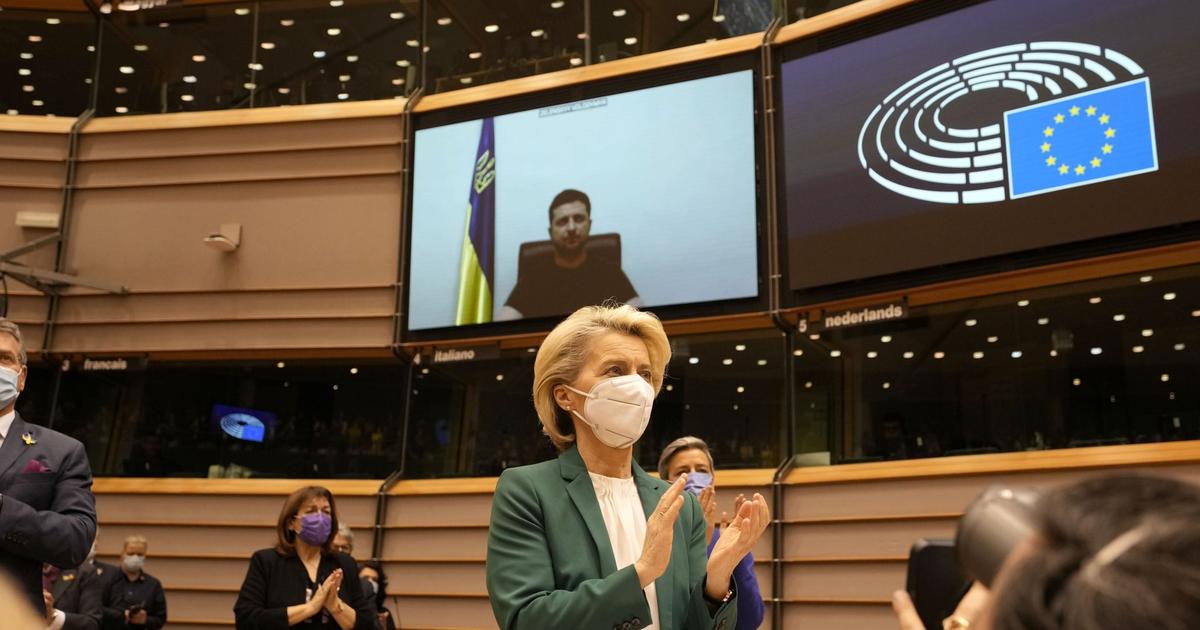Will this summit be that of a European leap forward?
Gathered in Versailles, the leaders of the Twenty-Seven are to discuss how the European Union can live up to its responsibilities in the face of Russian aggression in Ukraine.
Like last February 24, the meeting promises to be full of emotion.
But the general state of mind is now that of having reached a milestone.
"Russia's war of aggression constitutes a tectonic shift in European history",
states the draft declaration.
To discover
LIVE - War in Ukraine: follow the evolution of the conflict minute by minute
The Heads of State and Government of the Union will condemn the Russian actions, call for their cessation and for access for humanitarian aid.
They should also take stock of the impact of European sanctions.
Under pressure from Eastern and Central countries, additional measures will be discussed.
It is
"necessary and beneficial",
we assure, while specifying that no decision is expected.
Especially since a new package of sanctions has just been adopted.
Three Belarusian banks will be disconnected from Swift, 160 people, including 14 oligarchs, added to the EU blacklist.
In the financial field, the Europeans will limit the use of cryptocurrencies, used to circumvent the sanctions in place.
As for the reception of the 2 million Ukrainians who have now fled their country, this debate will take place without tension.
“We are still in a very tense phase, of reception.
For the moment, everyone is in support, ”
points out a diplomat.
See also
War in Ukraine: strengthen 27 armies to support a common European defense
The real difficulty will come on Thursday evening, when it comes to examining applications for membership of the European Union submitted by Ukraine, Moldova and Georgia.
All eyes are mainly on Kiev.
All agree to send a message of hope, to show that Ukraine belongs to the European family.
Earlier this week the ambassadors of the 27 countries formally asked the European Commission to analyze the requests from the three countries.
A decision taken in less than a week against several months in normal times, insists a diplomat, adding that
"it is therefore already an accelerated procedure".
Read also
Can Ukraine join the European Union “without delay”, as Zelensky demands?
But the Twenty-Seven will have to go further and give political guidelines to the Commission.
Should all three requests be analyzed at the same time?
Go fast?
What to do with the countries that are already candidates (Albania, North Macedonia, Montenegro, Serbia, Turkey)?
The divisions are strong, reflecting
“different histories, opinions and sensitivities within the EU on enlargement,”
says SWP researcher Ilke Toygür.
Very long process
A group of eight countries - led by Poland, Slovakia and Bulgaria - backs Kiev's move and wants to move fast.
Others are slowing down, Germany, Italy, Spain, Belgium, the Netherlands, but also France.
“Today, there is no question of membership”,
underlines the Elysee, pointing out that the priority will be to help these countries after the war.
And to bring them closer to the Union, there is the idea of creating a new status of privileged partner.
The membership process is very long anyway.
And nothing, or little, plays in favor of a new enlargement.
The war in Ukraine will influence debates on Europe's energy independence, the future of its defense and its economic capabilities.
But the approach here is
“with a long-term perspective”,
sums up Éric Maurice, of the Schuman Foundation.
On energy, the discussions should be lively.
“There is a clear desire to get out of dependence on Russian energies”
but the nuances are multiple, in particular on the advisability of imposing an embargo on Russian gas and oil, explains a European diplomat.
On this subject as on others,
“we should not expect a catalog of concrete and quantified measures.
European leaders will define the main guidelines for actions that will have to be clarified and implemented in the weeks and months to come,”
warns Éric Maurice.









